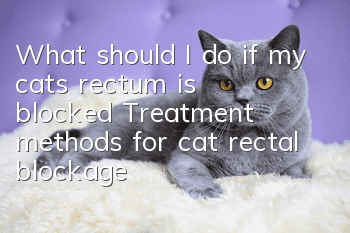What should I do if my cat’s rectum is blocked? Treatment methods for cat rectal blockage

The cat's rectum is blocked, he doesn't eat, and he seems to have little energy. It feels painful and parents are very worried about it. What should I do if my cat’s rectum is blocked? Treatment for rectal blockage in cats.
Rectal obstruction
The terminal part of the intestinal tract is the most common place for foreign body obstruction. Constipation can be painful due to intestinal damage, irritation and sometimes straining.
Treatment method
Gently lubricate the cat’s anus with salad oil or paraffin oil, or insert a glycerin suppository if there is still space in the intestine. If the blockage eventually fails to clear, seek veterinary treatment. He will anesthetize the cat first and then clear the blockage. Do not pull on the exposed threads of the cat's anus. The threads may become entangled in the bends of the intestines, and you may scratch the delicate wall membrane. In this case, you should see a veterinarian immediately for rectal prolapse
Continuous diarrhea and straining may cause a small section of the rectum to evert out, exposing the anus.
Rectal prolapse
It will cause irritation and cause the rectum to prolapse further.
Treatment
If your cat’s rectum prolapses, be sure to seek treatment from a veterinarian immediately. Before going to the vet, you can use a medicated cotton swab dipped in warm water to clean the exposed rectum, and then moisten it with some paraffin oil. After the veterinarian anesthetizes the cat, he can turn the rectum back to its original shape and sew a positioning thread. No matter what disease causes rectal prolapse, chronic diarrhea must be treated at the same time.
Anal irritation
Irritation of the cat's anus is usually caused by the writhing tapeworm segments or the tangled hairs after diarrhea. Tangled, matted hair is a sufficient condition for developing hygrodermatitis (a type of dermatitis with discharge), and the resulting moisture attracts flies to lay their eggs, which can hatch into maggots. Infected cats will turn around and bite their tails, tuck their tails under their bodies, or suddenly sprint forward short distances.
Treatment method
Cut off the long and tangled hair, then wash the anal area with soap and water, wash and dry. Apply a strong human repellent cream. If the anus is infected, your veterinarian will prescribe antibiotic ointment. If necessary, spray a small amount of maggoticide powder (provided by the veterinarian).
- How to train a Persian cat to use cat litter
- What is the average lifespan of a Bombay cat?
- What does it mean when a cat meows repeatedly?
- Can cats eat hairy clams?
- Can cats eat salty fish?
- Do cats need rabies vaccinations?
- Causes, symptoms and treatment of acute renal failure in cats
- What to do if your cat has anal cyst? How to treat anal cysts in cats?
- How to thoroughly disinfect your home for cat ringworm
- I don’t want to keep a cat because it affects my sleep.



